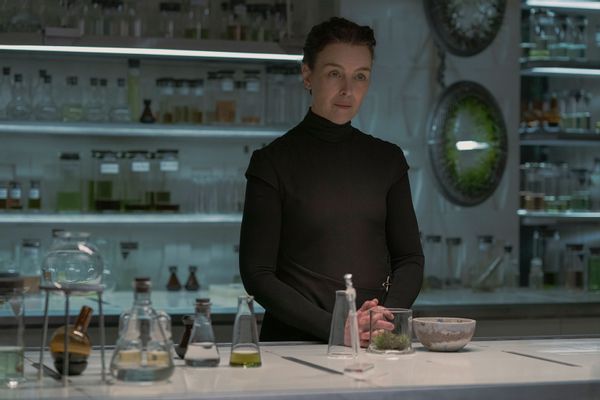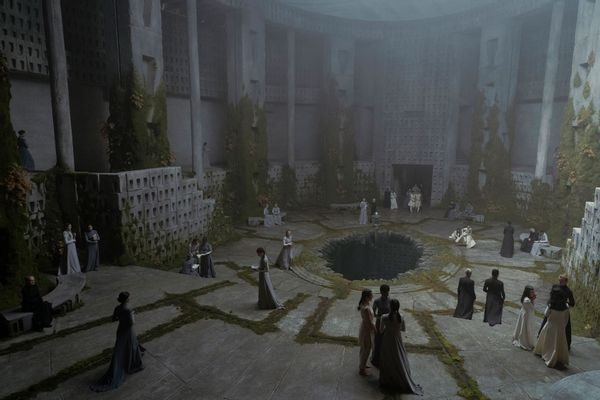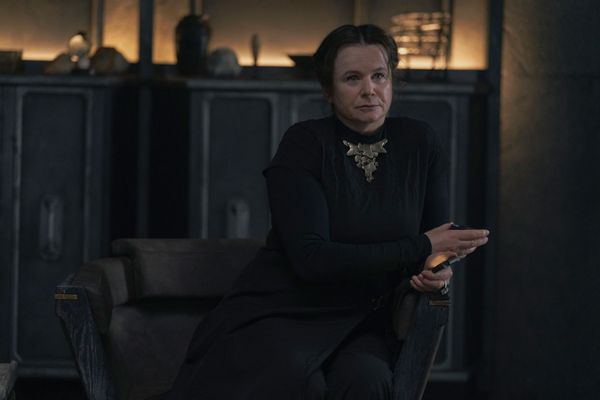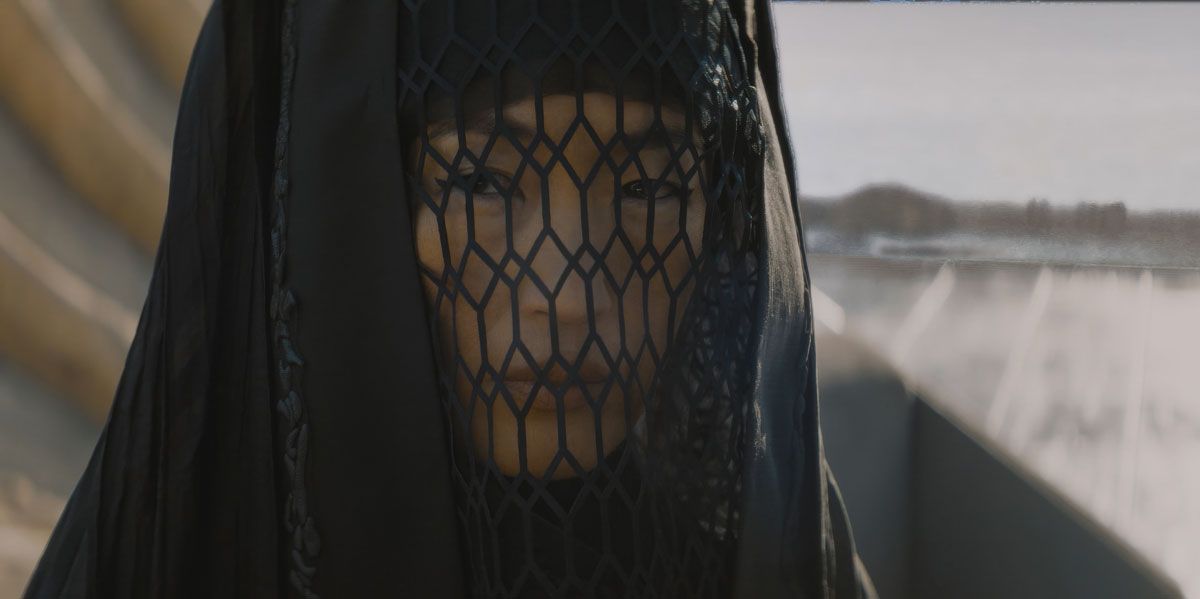While preparing to play Tula and Valya Harkonnen, “Dune: Prophecy” stars Olivia Williams and Emily Watson studied the faces of famous queens in the National Portrait Gallery. Williams recalled spending time with paintings of Mary, Queen of Scots and Elizabeth I.
“You know, in order for Elizabeth to rule and be queen, there had to be the cult of the Virgin Queen,” she observed, connecting the monarch’s trajectory to that of the Bene Gesserit, women quietly influencing power behind the scenes of Frank Herbert’s universe. The Sisterhood operates much like a convent, albeit one whose members train their bodies and minds to dominate their opponents, even a hardened soldier like Travis Fimmel’s Desmond Hart.
When Watson’s Mother Superior Valya warns him, “I would advise against playing games with me — I will win,” we believe her. By the time we’ve seen “Two Wolves” the second episode where this confrontation takes place, we’ve seen Valya command her rival to drive a knife into her throat. “Two Wolves” ends with Valya trying to repeat that finishing move on Desmond. It doesn’t go as planned.
“Remember that, as you no doubt know, the ‘Dune’ universe was created by a man in the ‘60s, and it's still quite a paternalistic view of how women can be powerful,” Williams added. “And one of the powers that we have is how terrified men are of women who get together and form a powerful base without them there.”
 Olivia Williams in "Dune: Prophecy" (HBO)
Olivia Williams in "Dune: Prophecy" (HBO)
When I spoke with Williams, Watson and “Dune: Prophecy” co-creator and showrunner Alison Schapker, this moment in our world was not yet written. The election hadn’t yet happened; therefore the United States hadn’t refused to elect its first woman president in favor of returning a 34-count felon found civilly liable of sexual assault to the Oval Office.
As the co-stars chatted with me in a video call from Britain there was still a sense of possibility that, somehow, things might turn out differently. And yet.
“Who could have foreseen that we would be back with laws pre-Roe v. Wade?” Williams said. “Who could have foreseen that we, politically, actually are back to when Frank Herbert wrote this? Well, it seems that history is not linear. It's circular. It keeps on coming around that women's rights, if you don't keep strong and pushing and keep it present, then they get they get lost in a cyclical way.”
If the adage that people tend to get the government they deserve is true, then the rise of “Dune” in the interregnum between Donald Trump’s first and second presidency is fitting. Every era of political disunity since 2000 has been met with a suitable cinematic epic.
Peter Jackson’s adaptation of J.R.R. Tolkien’s “The Lord of the Rings” trilogy defined the discontent of the George W. Bush era post-9/11. “Game of Thrones” and its cynical view of what makes a worthy leader saw us through the end of Barack Obama’s presidency. The dawn of the Trump era was met by “Rogue One: A Star Wars Story,” a herald of the resistance era.
 Dune: Prophecy (HBO)Herbert intended “Dune” to be a cautionary tale about charismatic leaders, a concept his son Brian continues in the trio of prequel novels “Dune: Prophecy” is based on. Under Schapker’s guidance, the story set 10,000 years before “Dune” hero Paul Atreides’ birth offers an additional layer of contemplation equal to its examination of power.
Dune: Prophecy (HBO)Herbert intended “Dune” to be a cautionary tale about charismatic leaders, a concept his son Brian continues in the trio of prequel novels “Dune: Prophecy” is based on. Under Schapker’s guidance, the story set 10,000 years before “Dune” hero Paul Atreides’ birth offers an additional layer of contemplation equal to its examination of power.
The first question Valya poses to the viewer is, “What holds more truth: history or prophecy?”
"One of the powers that we have is how terrified men are of women who get together and form a powerful base without them," Williams says.
“’Dune’ very much explores the power of the stories we tell, especially around charismatic leaders,” Schapker said in a separate conversation, further musing, “Who puts those stories into motion, and why, and to what end? Do they reflect the truth or not?
“It’s probably always good in a political moment to be examining those questions, but certainly, like you said, around an election, where you feel like there’s a sea change afoot,” Schapker continued. “To me, those are really pertinent questions to be asking of power.”
Filtering that interrogation through the Bene Gesserit’s perspective offers a different challenge from those we’re accustomed to confronting in other fantasy stories.
Reading the “Dune” universe from a woman’s perspective can be complicated. Aspects of Frank Herbert's construction of the Bene Gesserit seem empowering: The women of the Sisterhood represent total bodily autonomy, developing physical and psychological skills to master control over their bodies, down to their reproductive cycles. (One article I read accurate sums up the typical guy's view of the order by calling them "psychic space nuns who [bleep].")
We need your help to stay independent
They train to impose their will on others, manipulating royal bloodlines in the shadows and inserting members in crucial roles within every social strata. On the screen, David Lynch and Denis Villeneuve amp up the sinister side of their mystery, making the insult of calling them witches seem more justifiable.
Through “Prophecy” Schapker strikes a balance between Valya’s darkness and her determination to see through the mandate assigned to her by the Order’s founding Mother Superior Raquella Berto-Anirul (Cathy Tyson).
In the name of saving the Sisterhood from a prophesied annihilation, she uses the order’s maxim of sisterhood above all to consolidate power under her. Pushing younger, guiltless members to sacrifice themselves is part of the effort.
“’Dune’ very much explores the power of the stories we tell, especially around charismatic leaders,” Schapker said.
“I like both Frank and Brian [Herbert’s] extension of how women are operating in the Imperium because they're as formidable as anybody else,” Schapker said, explaining the story as a means of examining the perils of structural dominion.
“For any of us who've been involved in larger institutions, you realize there's the rhetoric of it, and then there's the reality of it. And you're constantly trying to negotiate that gap,” she said. “What I love about this is they exert power in so many ways. They're publicly exerting power: they're advising leaders, they're standing there being their human Truthsayers. And they're secretly exerting power. They have plans within plans.”
 Emily Watson in "Dune: Prophecy" (HBO)This is precisely why Fimmel's Desmond Hart has positioned himself as their adversary, first by knocking off the Bene Gesserit Reverend Mother who served as the emperor’s Truthsayer and then, once he’s let Valya know he intends “to wipe out every trace of you and your sisters from our worlds,” demonstrates he’s immune to her greatest power: a Voice that compels those who hear it to do her bidding.
Emily Watson in "Dune: Prophecy" (HBO)This is precisely why Fimmel's Desmond Hart has positioned himself as their adversary, first by knocking off the Bene Gesserit Reverend Mother who served as the emperor’s Truthsayer and then, once he’s let Valya know he intends “to wipe out every trace of you and your sisters from our worlds,” demonstrates he’s immune to her greatest power: a Voice that compels those who hear it to do her bidding.
“I always wondered what your greatest fear would be. Now I have seen it,” he tells her at the close of “Two Wolves.” “It’s not that no one will hear you. It’s that they’ll hear you and just won’t care.” Forgive us if that sounds like the plight of everyone on the cusp of a second Trump age that promises to roll back civil rights even further.
Want a daily wrap-up of all the news and commentary Salon has to offer? Subscribe to our morning newsletter, Crash Course.
Watson understands, although she believes viewing “Dune: Prophecy as a “sort of feminist tract” would be a mistake. "The Bene Gesserit are very flawed individuals, and they exist in a complex world,” she said. “What they do have is power, not necessarily in a good way.”
Besides, as William cites, Herbert’s concept of what it takes to read truth from lies in a person’s expression is outdated. The cast received a handbook explaining how the sisters can tell if someone's lying. Veins in their forehead and throat pump more quickly. They break into a sweat. Their eyes drop to the left.
“And we all know now that charismatic leaders don't do any of that when they lie. That there are people around who can look you straight in the eye and laugh and lie, and lie and laugh,” she said. “In a way, the ‘60s sci-fi writers couldn't foresee a time when lying was so completely done without conscience or redress to the truth.”
“Or consequence,” Watson added.
“That's something that has changed since the books were written,” Williams continued. “I think in Frank Herbert's generation, liars may still have had a trace of conscience . . . But there's none of that now.”
Having said all that, Watson does see one positive evolution since the “Dune” author’s time. “Olivia and I, we’ve known each other decades,” she revealed. “And if we'd sat down in our 20s and gone, ‘You know what? When we're in our 50s, we will be leading a major TV series playing incredibly powerful women,’ you'd have gone, ‘No way. That's never going to happen.’ So in that sense, in our world, this is a sea change.”
“I think what we're saying is emulate Olivia and Emily,” Williams finished, “not Tula and Valya.”
"Dune: Prophecy" airs at 9 p.m. Sundays on HBO and streams on Max.



Shares